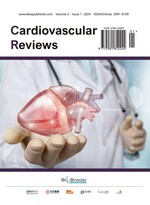摘要
Objective: To explore the clinical efficacy of recombinant human brain natriuretic peptide (rhBNP) and sacubitril-valsartan in the sequential treatment of acute heart failure (AHF) in older individuals. Methods: Clinical data from 64 older patients with AHF were collected for this study. The patients were divided into two groups: a control group (Group A, n = 34) and an observation group (Group B, n = 30) based on different treatment regimens. Group A received rhBNP treatment, while Group B received sequential treatment with rhBNP and Sacubitril-Valsartan. The evaluation of the sequential treatment’s effect on older patients with AHF was conducted using various indicators. Results: The clinical efficacy rate in Group A (93.33%) was significantly higher than that in Group A (73.53%), with a significant difference observed (P < 0.05). Furthermore, after treatment, the clinical efficacy remained significantly higher in Group B than in Group A. Group B exhibited a significantly higher left ventricular ejection fraction (LVEF) and significantly lower systolic blood pressure, diastolic blood pressure, and heart rate compared to Group A (P < 0.05). Although the left ventricular end-diastolic diameter (LVEDD) was lower in Group B after treatment, the difference was not statistically significant (P = 0.127). Moreover, post-treatment levels of NT-proBNP were significantly lower in Group B compared to Group A (P = 0.01). Additionally, Group B had shorter hospitalization times, faster improvement in clinical symptoms, and further 6-minute walking distances after the treatment compared to Group A (P < 0.01). Conclusion: Sequential treatment with rhBNP and Sacubitril-Valsartan demonstrates promising therapeutic effects in older patients with AHF, suggesting its potential for broader adoption and promotion in clinical practice.
参考
Wang Y, Wang P, Li H, 2017, Research Progress on Acute Heart Failure in Older People. Chinese Journal of Geriatric Cardiovascular and Cerebrovascular Diseases, 19(12): 1342–1344.
Fang J, Zeng W, 2021, A Meta-Analysis of the Clinical Efficacy of rhBNP in Treating Patients with Acute Myocardial Infarction and Heart Failure. Am J Trans Res, 13(4): 2410–2421.
Han C, Wang C, 2023, Effect of Recombinant Human Brain Natriuretic Peptide as Adjuvant Treatment for Older Patients with Acute Myocardial Infarction Complicated by Heart Failure and Its Impact on Oxidative Stress Indicators. Doctors, 8(19): 35–38.
Tang WHW, Kiang A, 2020, Acute Cardiorenal Syndrome in Heart Failure: From Dogmas to Advances. Curr Cardiol Rep, 22(11): 143. https://doi.org/10.1007/s11886-020-01384-0
Shi J, Zhao Z, 2020, Sacubitril-Valsartan’s Efficacy in Treating Acute Heart Failure and Its Effect on Serum Neurohormonal Factors. Guizhou Medicine, 44(11): 1716–1717.
Xiong Z, Man W, Li Y, et al., 2020, Clinical Efficacy of Sacubitril-Valsartan in Patients with Heart Failure After Myocardial Infarction. Heart Journal, 32(1): 28–32.
Zhou L, Wang F, Tang X, 2020, Observation of the Clinical Effect of Recombinant Human Brain Natriuretic Peptide in the Adjuvant Treatment of Acute Heart Failure in Older People. Chinese Journal of Health Inspection, 30(5): 521–523 + 528.
Huang J, Liang Y, Lin Y, 2022, Observation on the Efficacy of Recombinant Human Brain Natriuretic Peptide and Sacubitril-Valsartan in the Sequential Treatment of Acute Heart Failure in Older People. Journal of Xinjiang Medical University, 45(11): 1296–1300.
Guo Q, Liang G, Guo Q, et al., 2021, Analysis of the Effect of Recombinant Human Brain Natriuretic Peptide-Sacubitril-Valsartan Sequential Treatment of Acute Heart Failure. Journal of Practical Medicine, 37(7): 919–923.
Liu Y, Liu H, 2021, Clinical Value of Recombinant Human Brain Natriuretic Peptide-Sacubitril-Valsartan Sequential Therapy in Treating Acute Heart Failure. Chinese Journal of Drug Abuse Prevention and Control, 27(6): 978–980 + 989.
